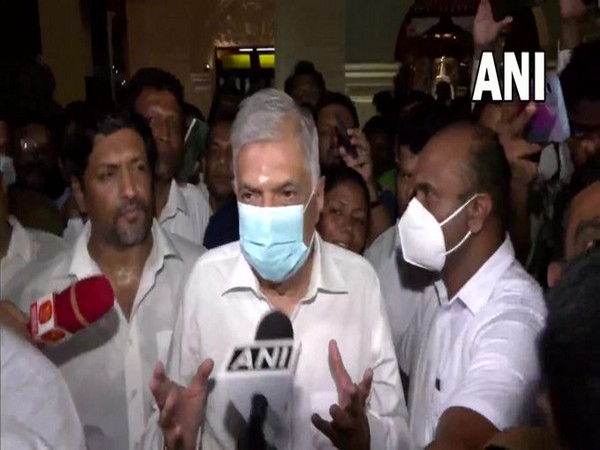Ranil Wickremesinghe exudes confidence of IMF helping Sri Lanka during economic crisis
Assuring the countrymen of uplifting the country's economy, newly-appointed Sri Lanka's Prime Minister Ranil Wickremesinghe on Thursday exuded confidence of International Monetary Fund (IMF) helping the Island nation during its worst economic crisis.

- Country:
- Sri Lanka
By Ashoke Raj Assuring the countrymen of uplifting the country's economy, newly-appointed Sri Lanka's Prime Minister Ranil Wickremesinghe on Thursday exuded confidence of International Monetary Fund (IMF) helping the Island nation during its worst economic crisis.
Speaking to ANI, Wickremesinghe said, "I am sure that the IMF will help us," shortly after taking oath as the 26th Prime Minister of the country. "I have taken up the challenge of uplifting the economy and I must fulfil it," Wickremesinghe said.
Amid the severe economic crisis, a high-level delegation including the Governor of the country's Central Bank and other senior officials attended a meeting at the IMF office in Washington last month. Managing Director Kristalina Georgieva and other senior members of IMF management met with a Sri Lankan delegation, led by Finance Minister Ali Sabry and Central Bank of Sri Lanka Governor Nandalal Weerasinghe, and discussed policy actions to address economic challenges.
"The discussions covered recent economic and financial developments in Sri Lanka, the need for implementing a credible and coherent strategy to restore macroeconomic stability, and the importance of stronger social safety nets to mitigate the adverse impact of the current economic crisis on the poor and vulnerable," Masahiro Nozaki, IMF's mission chief for Sri Lanka said. Sri Lanka is facing its worst economic crisis since independence with food and fuel shortages, soaring prices and power cuts affecting a large number of the citizens, resulting in massive protests over the government's handling of the situation.
The recession is attributed to foreign exchange shortages caused by a fall in tourism during the COVID-19 pandemic, as well as reckless economic policies, including the government's last year's move to ban chemical fertilizers in a bid to make Sri Lanka's agriculture "100 per cent organic". Due to an acute shortage of foreign exchange, Sri Lanka recently defaulted on the entirety of its foreign debt amounting to about USD 51 billion.
The economic situation led to huge protests with demands for the resignation of Prime Minister Mahinda Rajapaksa and President Gotabaya Rajapaksa, with the former finally succumbing to public pressure and resigning on Monday, soon after the protests outside the Prime Minister's residence turned violent. (ANI)
(This story has not been edited by Devdiscourse staff and is auto-generated from a syndicated feed.)
ALSO READ
Central Bank Heist: Uganda's $16.8 Million Cyber Theft
High Seas Sweep: 500 kg Crystal Meth Seized in Major India-Sri Lanka Joint Operation
Varga Nominated as Next Hungarian Central Bank Governor Amid Economic Revival Challenges
Uganda Central Bank Falls Victim to Cyber Heist
India and Sri Lanka Seize Crystal Meth in Arabian Sea Anti-Narcotics Operation










